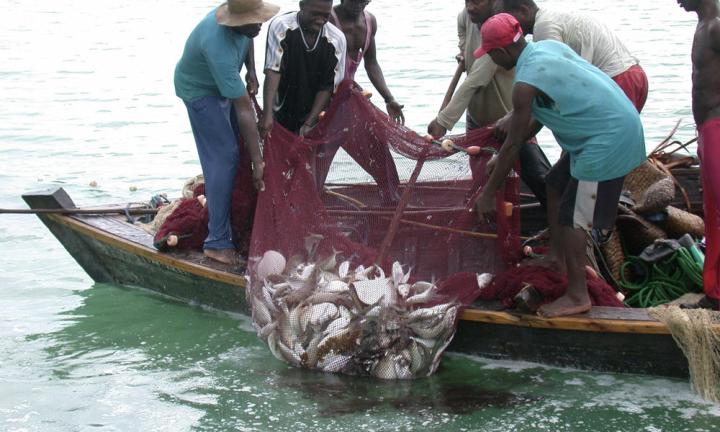ISS TODAY
Saving Lake Victoria means going after the big fish

Corruption and organised crime are decimating the fish population in Lake Victoria, and threaten the livelihoods of thousands.
First published by ISS Today
Illegal, unregulated and unreported fishing is threatening the survival of Lake Victoria’s fish populations, and is putting local livelihoods at risk. Some 76% of fish species in the lake currently face extinction – including crustaceans such as shrimps and crabs.
Corruption is one of the primary reasons that this problem thrives in Lake Victoria. A Kenyan state official who works with a national body that manages inland waterways told ENACT that crime syndicates typically “mix legal and illegal fish products”. They then ship these consignments out using the waterways of the three countries surrounding the lake – Kenya, Uganda and Tanzania.
Customs officials are bribed to allow consignments to pass without being inspected. Illicit consignments are transported along licit channels, and it becomes near impossible to identify what has been caught illegally. A tilapia platter served in Angola or South Africa might well have been illegally caught and shipped out of Lake Victoria.
Illegal fishing however isn’t the only reason for the drop in Lake Victoria’s fish populations. The International Union for Conservation of Nature (IUCN) identifies biological resource use – primarily overfishing – as just one of the four key factors driving the decline. The other drivers are pollution, agriculture and invasive species.
Illegal fishing gear (including trawl nets), and unorthodox fishing methods such as poisoning, contribute to the depletion of species. Such methods also fuel hostility among local fishermen, as fish become scarce.
The Kenyan state official said other forms of organised crime occurred alongside illegal fishing. These networks are also involved in wildlife crime, including the poaching of species such as hippopotamus, pangolins and snakes – especially pythons. He said law enforcement officers from the three countries were complicit in the “pipeline of organised crime in the lake”, and that police received bribes of up to $3,000 per shipment from these transnational crime groups as a “protection fee”.
A 2018 study found that “corruption fuels illegalities and undermines the legitimacy of fisheries co-management” in Lake Victoria. It points out that corruption in managing the lake is systemic, involving officials such as the police and judiciary in all three countries.
The laws of these three countries ban overfishing and unconventional practices such as the use of firearms, explosives, electrical shock devices or toxic substances for fishing. These methods are frequently used by organised criminal groups. The impact on the environment is severe, as are the associated revenue losses.
A Kenyan fisheries official, who spoke to ENACT on condition of anonymity, said the volume of undeclared and illegally caught fish was almost double the declared tonnage. According to the official, most undeclared fish is shipped out of the region by large organised crime syndicates.
The Lake Victoria Fisheries Organisation (LVFO), a specialised institution of the East African Community, says the use of illegal fishing equipment has been increasing for over a decade. This includes prohibited nets, small hooks and monofilament nets.
LVFO and member country research institutions jointly release annual figures on fish production from Lake Victoria. In its Fisheries Management Plan for the period 2016-20, the LVFO notes that the annual haul is around a million tonnes, worth over $800-million. The industry provides direct employment for more than 800,000 people. Illegal and undeclared fishing puts these livelihoods at risk.
A strong, functional and uncorrupted response is crucial in fighting large-scale illegal fishing around Lake Victoria. Up to now, law enforcement has focused on artisanal fishermen. In many instances, individuals from Tanzania, Uganda and Kenya are arrested for fishing outside their country’s territorial waters or using illegal fishing equipment.
The use of illegal fishing gear is certainly part of the problem – and Ugandan fishermen have questioned why the government allows such equipment to be imported in the first place. This implies that corruption is an enabling factor in this area as well.
A concerted regional response is clearly needed. Yet co-ordination among the three countries’ relevant departments – environment, fisheries and trade – has been minimal, as more pressing issues compete for governments’ attention. Even within these governments, coordination is lacking between the various departments.
There have been some promising developments though. In February 2019, the Tanzanian government instituted mobile courts to preside over certain crimes. These courts have also been used to instantly rule on cases of illegal fishing, to deter corruption and the bribing of government officials. And in April, officials from Kenya and Uganda met to discuss fishing operations, which included prosecuting those involved in fisheries crimes.
The East African Community can enhance such inter-agency collaboration, for instance between member countries’ respective departments of fisheries and the environment. This would help bring down organised crime syndicates that fuel illegal fishing.
Joint patrols aimed at intercepting organised criminal groups operating around the lake could be streamlined and enhanced. These might also help tackle other criminal markets, such as wildlife poaching, which perpetuate illegal fishing. DM
Mohamed Daghar is a researcher, ENACT project, ISS Nairobi
This article was first published by the ENACT project. ENACT is funded by the European Union (EU). The contents of this article are the sole responsibility of the author and can under no circumstances be regarded as reflecting the position of the EU


















 Become an Insider
Become an Insider